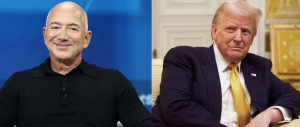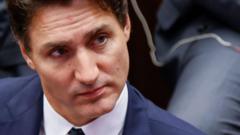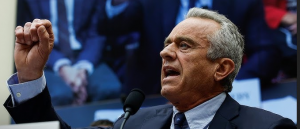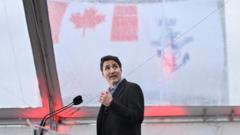The resignation of finance minister Chrystia Freeland has left Canadian Prime Minister Justin Trudeau's administration in disarray, as tensions escalate over Trump's proposed tariffs on Canadian goods. With calls from within his own Liberal Party to step down, Trudeau’s leadership appears threatened as he navigates a complex political landscape.
Trudeau Faces Crisis as Former Finance Minister Resigns Amid Trump Tariff Threat

Trudeau Faces Crisis as Former Finance Minister Resigns Amid Trump Tariff Threat
Canadian Prime Minister Justin Trudeau's government is in turmoil following Chrystia Freeland's sudden resignation, raising questions about his leadership amid a looming tariff threat from Donald Trump.
Freeland's departure came as a shock to the Trudeau administration, coinciding with a crucial economic update that she was expected to deliver. In her resignation letter, Freeland voiced her frustration over Trudeau's approach to dealing with Trump's tariff threat, which includes a potential 25% levy on imported Canadian products unless border security is enhanced. Economists fear these tariffs could severely harm Canada's economy. Freeland’s resignation not only blindsided the government but also came just hours before Trudeau faced his party members, some of whom urged him to quit.
The relationship between Trudeau and Freeland has been strained since the revelation that the Prime Minister no longer saw her as a key economic advisor. In response to Freeland's critiques, Trump labeled her behavior "toxic" and indicated his ongoing commitment to impose tariffs unless conditions were met.
As the political fallout continues, the Liberal Party has suffered further blows—most notably, losing a seat to the Conservative Party in a by-election, marking its third such defeat this year. Analysts suggest that Trudeau finds himself increasingly isolated, with key allies like Freeland no longer in his cabinet, leading to a perception of confusion and uncertainty regarding Canada's response to U.S. economic policy under Trump.
This escalating situation highlights a broader divide among U.S. allies. While Canada attempts diplomatic overtures, such as Trudeau's visit to Trump at Mar-a-Lago, there is a clamor for a stronger stand against U.S. economic nationalism. Experts suggest Canada has to decide between a confrontational approach or one focused on compromise.
Trudeau's government is under scrutiny not only from opposition parties but also from within his ranks, as Liberal MPs express doubts about his leadership. Polls reveal his approval ratings have plummeted from 63% to around 28%, complicating his party's prospects for the next federal election set for October 2024. Amidst this backdrop, Ontario Premier Doug Ford characterized the situation as chaotic, stressing the need for a unified front to project stability during these turbulent times.
In recent communications with party colleagues, Trudeau has acknowledged the gravity of the moment but asserted his commitment to ongoing leadership, indicating he does not have immediate plans to resign even as pressure mounts from various quarters.
The unfolding crisis within Trudeau's government reflects not only internal party dynamics but also the external pressures posed by U.S. policy, which could reshape Canada's political landscape in the near future.
The relationship between Trudeau and Freeland has been strained since the revelation that the Prime Minister no longer saw her as a key economic advisor. In response to Freeland's critiques, Trump labeled her behavior "toxic" and indicated his ongoing commitment to impose tariffs unless conditions were met.
As the political fallout continues, the Liberal Party has suffered further blows—most notably, losing a seat to the Conservative Party in a by-election, marking its third such defeat this year. Analysts suggest that Trudeau finds himself increasingly isolated, with key allies like Freeland no longer in his cabinet, leading to a perception of confusion and uncertainty regarding Canada's response to U.S. economic policy under Trump.
This escalating situation highlights a broader divide among U.S. allies. While Canada attempts diplomatic overtures, such as Trudeau's visit to Trump at Mar-a-Lago, there is a clamor for a stronger stand against U.S. economic nationalism. Experts suggest Canada has to decide between a confrontational approach or one focused on compromise.
Trudeau's government is under scrutiny not only from opposition parties but also from within his ranks, as Liberal MPs express doubts about his leadership. Polls reveal his approval ratings have plummeted from 63% to around 28%, complicating his party's prospects for the next federal election set for October 2024. Amidst this backdrop, Ontario Premier Doug Ford characterized the situation as chaotic, stressing the need for a unified front to project stability during these turbulent times.
In recent communications with party colleagues, Trudeau has acknowledged the gravity of the moment but asserted his commitment to ongoing leadership, indicating he does not have immediate plans to resign even as pressure mounts from various quarters.
The unfolding crisis within Trudeau's government reflects not only internal party dynamics but also the external pressures posed by U.S. policy, which could reshape Canada's political landscape in the near future.




















